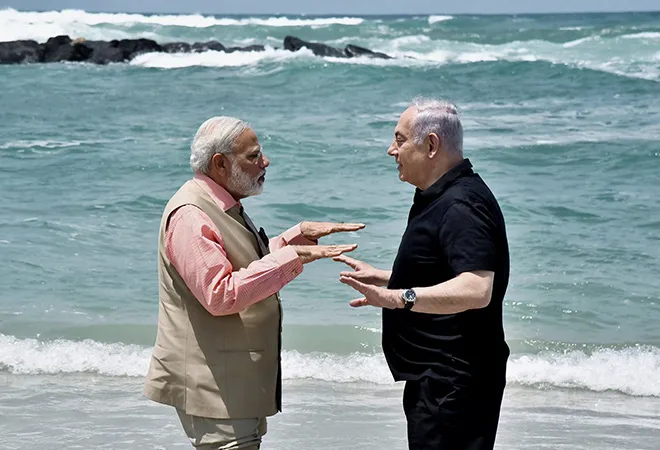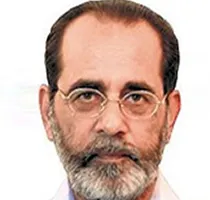-
CENTRES
Progammes & Centres
Location
There is a natural affinity in political style that draws both leaders together.

As high-level visits go, Prime Minister Narendra Modi's visit to Israel was bound to attract superlatives like 'historic' and ‘groundbreaking'. Still, it is clear that the buzz in the relationship is on account of Mr. Modi's personal diplomatic style and his host's equally warm response.
Israel's Prime Minister Benjamin Netanyahu set the tone when he welcomed Mr. Modi at the airport together with the spiritual leaders of all the major faiths in the region, an honour traditionally reserved for the US President and the Pope. Mr. Modi's trademark bear hugs were reciprocated, three at the airport, and by the time the visit ended, the TV commentators had lost count!
Mr. Netanyahu gushingly described the relationship between the two countries as "a marriage made in heaven", but behind the success was a receptive political backdrop as well as the careful planning undertaken by both sides.
Marking 25 years of establishing diplomatic relations between the two countries added to the historic character of an Indian prime minister's first visit to a country that had quietly emerged as a strong defence partner. There had been high-level exchanges but the Indian response was cautious. Foreign Minister Shimon Peres first visited India in 1993, and Jaswant Singh reciprocated in 2000; President Ezer Weizman came in 1997, while President Pranab Mukherji's visit only took place in 2015. The first Israeli prime minister to visit India was Ariel Sharon in 2003, and from the time Mr. Modi came to power, a return visit was a certainty. The two leaders had met on the margins of the UN General Assembly and continued their relationship by tweeting their greetings on Hanukkah and Diwali.
Yet, official-level exchanges between the two countries have been intensive, beginning with the visit of Foreign Secretary J.N. Dixit in early 1993. While relations between Mossad and Research and Analysis Wing had existed earlier, the strategic partnership got cemented when National Security Advisor-level dialogue was established in 1999 between Brajesh Mishra and Gen. (retd.) David Ivry. Gen. Ivry was a former Air Force chief who had led the air raid on Osirak, the Iraqi nuclear reactor, in 1981. Incidentally, Israel was one of the few countries that showed complete understanding of India's decision to undertake the nuclear tests in 1998. This reinforced both the defence and the counterterrorism cooperation relationship.
By 2000, India was acquiring surface-to-air missiles (Barak 1) and UAVs (unmanned aerial vehicles) from Israel. Subsequently, the refurbishing of MiG-21 aircraft employed Israeli avionics. During the 1999 Kargil war, Israel assisted with laser-guidance kits mated with gravity bombs, carried by the Mirage 2000 aircraft. With US concurrence, Israel sold India the Phalcon airborne early warning system and mounted on the Russian Il-76, provided AWACs capability. Subsequent acquisitions have included Spike anti-tank guided missiles and the long range surface-to-air missiles in both the naval and land versions. Today, Israel has emerged as the third-largest defence supplier for India and accounts for over 40% of Israel's defence exports.
Commercial relations between the diamond traders in Gujarat and Israel had existed before 1992, but now annual trade grew from $200 million to nearly $5 billion with gems and jewellery accounting for nearly 40%. Gradually, Science and technology, agriculture, biotech and space emerged as new areas of cooperation.
Tourism provided an impetus to people-to-people relations. India emerged as the preferred destination for young Israelis wanting to unwind after their compulsory military service and Hebrew signage in Varanasi, Manali and Goa is a common sight. Ambassador Pavan Kapoor was being quite matter of fact when he described the Modi visit as a 'coming out visit' for the relationship.
In addition, both sides made efforts to ensure a productive visit. Mr. Modi had already undertaken visits to the United Arab Emirates, Saudi Arabia, Qatar and Iran before embarking on his trip to Israel. Receiving Palestinian President Mahmoud Abbas in Delhi in May eased the politics of skipping a visit to Ramallah while visiting Israel.
A number of preparatory visits covering diverse areas of agriculture, water resources and space took place under effective coordination of the Prime Minister's Office. On the Israeli side, the cabinet approved a 23-page document identifying potential cooperation areas with India with inputs from 11 government departments and a commitment of $79.6 million.
The outcome is an impressive joint statement which elevates the relationship to a 'strategic partnership'. In addition to defence and homeland security, it highlights other areas of science and technolgy, innovation, trade and investment. Of the MoUs signed, three pertain to space, two to water management and sanitation and one to agriculture. During the last three years, Israel has already set up 15 centres of excellence for introducing improved practices, particularly in horticulture and agro-processing. As a water-challenged state, Israel recycles 90% of its water, and 95% of sewage is processed for agricultural use, making it virtually a closed water cycle.
An Industrial R&D and Innovation Fund has been created with a contribution of $20 million each to promote knowledge-based partnerships. Israel today boasts of nearly 4,500 start-ups and 140 incubators/accelerators. In a recent study, NASSCOM and Accenture estimated that cooperation with Indian start-ups has the potential to generate $5 billion within five years.
The positive outcome was overshadowed by the optics surrounding the visit — the hugs, images of Mr. Netanyahu accompanying Mr. Modi everywhere, the emotionalism of meeting young Moshe Holtzberg, the two leaders walking barefoot on the beach, Mr. Netanyahu recalling his dinner date with his wife Sara thirty years ago at an Indian restaurant as he hosted Mr. Modi for a private dinner… this is what enabled the two leaders to personalise the substantive outcome.
There is a natural affinity in political style that draws both leaders together. In his first campaign for prime ministership in 1996, Mr. Netanyahu honed his election style with help from Arthur Finkelstein, an American consultant who had been campaign adviser to Republicans like Jesse Helms, Richard Nixon and Ronald Reagan. Sharp attacks on opponents, calls for making 'peace' safe, a demilitarised Palestinian state even as he pushed ahead with Jewish settlements, and polarising sound bites have now become Mr. Netanyahu's trademarks as he has led three successive coalition governments since 2009.
It is a style familiar to Mr. Modi's. His decision to not visit Ramallah indicates that he is not worried about vote-bank politics. Both leaders project a strong nationalism, enjoined with faith. And this is perhaps where the key difference is — Israel is a country founded on Zionism and Mr. Modi readily accepted his host's impromptu suggestion to visit the grave of Theodor Herzl, the founder of Zionism. But when Mr. Netanyahu makes his return visit to India, possibly in 2018, and Mr. Modi accompanies him to Raj Ghat, they will pay homage to Mahatma Gandhi, the father of the nation who wanted to keep faith apart from nationalism in independent India. This is why the Israeli practice of using a 'human shield' by Major Leetul Gogoi in Kashmir became controversial.
It is worth remembering that during a visit to Beijing in March, Mr. Netanyahu had also described Israel's relationship with China as 'a marriage made in heaven.' An Israel-China comprehensive innovation partnership with an outlay of $300 million has been launched.
Fortunately, there is enough content in the India-Israel relationship though successful summitry depends on personal chemistry between leaders. Both sides have agreed to establish a task force to ensure implementation of the announcements made. This will ensure that the relationship stays on track and Mr. Netanyahu's return visit is a success.
This commentary originally appeared in The Hindu.
The views expressed above belong to the author(s). ORF research and analyses now available on Telegram! Click here to access our curated content — blogs, longforms and interviews.

Ambassador Rakesh Sood was a Distinguished Fellow at ORF. He has over 38 years of experience in the field of foreign affairs economic diplomacy and ...
Read More +